Judging vs. Perceiving (J vs P): Which Are You?
One of the most confusing things about the MBTI® is the Judging or Perceiving preference. Many people get these preferences confused or feel unsure about which preference they use. I’m really hoping this article will make it a little easier for people to understand and figure out the whole J/P mystery.
Not sure what your personality type is? Take our new personality questionnaire here. Or you can take the official MBTI® here.

Table of contents
Estimated reading time: 8 minutes
Judging and Perceiving – What do they even mean?
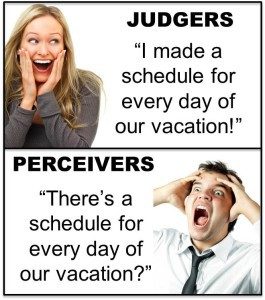
The J or P preference stands for judging or perceiving. This preference shows how you interact with the outside world. It doesn’t say anything about what’s inside you; only how you interact externally, and how others perceive you.
To understand the J/P preferences, we have to figure out some MBTI® basics:
Everyone has two judging and two perceiving functions:
- The judging functions are thinking and feeling.
These functions determine how you make decisions; based on values, ethics, and the emotional needs of others (feelers) or logic, causality, and efficiency (thinkers). - The perceiving functions are sensing and intuition.
These functions determine how you take in information; through your five senses (sensing) or through patterns and underlying meanings (intuition).
Every person uses all four of these preferences. If you’re an ESTP, you’re both a sensor/intuitive/feeler/and thinker.
Wait, what?!
That’s right. If you’re an ESTP you’re a dominant sensor. You make decisions with thinking. But you back up your personality with feeling and intuition, even though they are not as powerful as your sensing and thinking sides.
We all use all the things.
Your middle two letters (for example the ‘SF’ in ISFJ) tell us which two functions are your strongest. In the case of the ISFJ, Sensing and Feeling are the strongest functions. ISFJs still use intuition and thinking, but those functions are much weaker than sensing and feeling.
Every person extraverts (shows the world) two functions, and introverts (internalizes) two functions. You can see this in the example of an ENFP below:
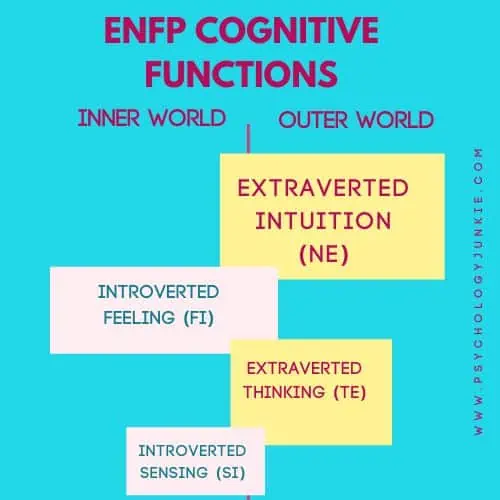
You can see that the ENFP extraverts intuition and thinking, and introverts feeling and sensing. The top two rectangles you see are the dominant and auxiliary functions. The bottom two functions are the tertiary and inferior functions.
If you are a J personality type then you show the world (extravert) either thinking or feeling in your dominant or auxiliary position.
If you’re a P personality type then you show the world (extravert) either sensing or intuition in your dominant or auxiliary position.
Let’s clear up some misconceptions
A lot of people think that P types are disorganized or messy and that J types are clean and neat. I want to get this out of the way now; the J or P preference is no indicator of messiness or neatness. Both J and P types can be messy or disorganized. All the J or P letter at the end of your type means is that you show the world either your judging process or your perceiving process.
Another misconception is that the ‘J’ for judging means ‘judgmental’. J types are no more judgmental than P types; judging simply refers to the decision-making process, and whether or not that decision-making process is shown to the outside world. J types extravert their decisions (judgments) while P types introvert their decisions (judgments).
J (Judging) Personality Types
If you are an IJ or EJ type, then your first extraverted function is a decision-making function (Thinking or Feeling).
The decision-making functions are going to make the J personality type seem more decisive. Judgers may seem outwardly to be better planners who like to have things ‘settled’ and organized. They probably prefer closure in their outer relationships, and they like to have things decided and predicted in advance.
Judgers often appear to be very task-oriented and might like organizing their projects with to-do lists. Whether they are actually organized has nothing to do with their J/P preference, the J/P preference will only detail how the type likes to organize. Do they make their decisions through external interactions (talking, planning with lists, and other external tools) or do they make their decisions through an internal, private process?
Judgers tend to outsource perspectives when it comes to their decisions. Feeling-Judging types externalize their feelings so that they can get a variety of perspectives and opinions about the right step forward. Thinking-Judgers tend to externalize their thoughts and opinions in order to narrow down the best, most logical path forward.
Since the J preference only describes what someone shows to the outer world, they may internally feel very flexible, adaptable, and open to new information. Even though they talk out their decisions they internally may be very open to alternate viewpoints.
IJ types will seem less like stereotypical Judgers than EJ types. This is because IJ types have a dominant perceiving function. Even though this perceiving function is internalized, it will greatly influence their judging process, making them more likely to be mistyped as Perceivers. For example, the INFJ leads with dominant Introverted Intuition (a perceiving function), but shows the world an auxiliary judging function (Extraverted Feeling).
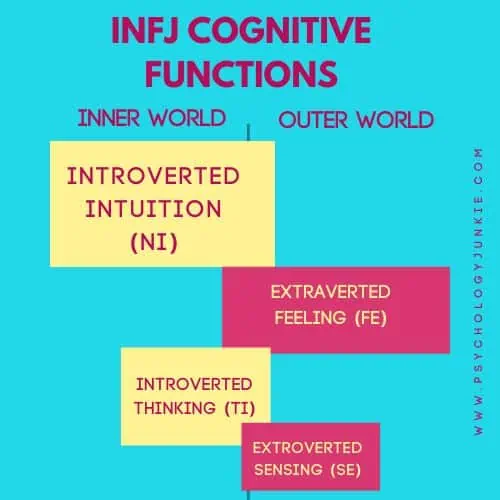
E–J types will lead with a dominant extraverted judging function, so they will probably seem the most ‘J’ like of any personality type.
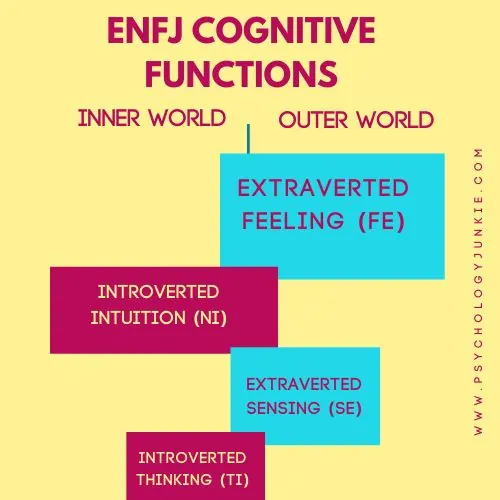
Keep in mind that introverts are a lot easier to mistype than extroverts.
P (Perceiving) Personality Types
If you’re an IP or EP type, then your first extraverted function is a perceiving function. For example, an ENFP’s first extraverted function is intuition; so this is what they show to the world. An ISTP’s first extraverted function is sensing, so that is what they show to the world.
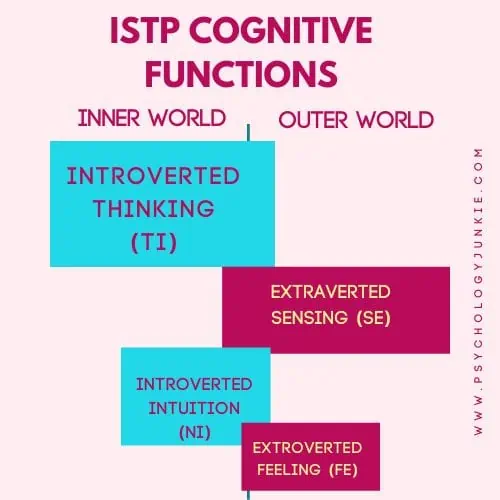
These externalized perceiving functions are going to make the P personality types seem more laid-back and flexible. Because their most prominent decision-making process (of thinking or feeling) is internalized they will show the world mostly how they perceive things; and although it will be influenced by their internal judging process, their decision-making process won’t be as obvious.
For this reason, Perceivers often seem more open-minded and laid back. They seem more spontaneous and adaptable. They will talk about what they observe more than what they have decided on. They and are more focused outwardly on exploring opportunities and possibilities than coming to conclusions. Deadlines, plans, and predictability tend to make Perceivers stressed, not relaxed.
Since this preference only describes what they show to the outer world, inside Perceivers can be very planned or decisive. What may seem like a sudden, spontaneous decision could have been internally planned for months, particularly with the IP types.
IP types have a dominant introverted judging function, which will make them relate to certain traits of Judging types. For example, the ISTP type leads with dominant introverted thinking (a judging function), but shows the world an auxiliary perceiving function of extraverted sensing. Because their dominant function is a judging function they will be more inwardly decisive and firm than they appear on the outside. They just won’t express their judgments as externally as a Judging type would. EP types will relate more to Perceiver stereotypes than IP types will. This is because their dominant function is a perceiving function AND this is the function they show to the outer world.
What Do You Think?
I know this post is kind of wordy, but hopefully now the J/P preference makes more sense! Have you ever been mistyped by someone? Has this helped you get a better idea of your type? Let me know in the comments! I’d love to hear from you!
Find out more about your personality type in our eBooks, Discovering You: Unlocking the Power of Personality Type, The INFJ – Understanding the Mystic, The INFP – Understanding the Dreamer, and The INTJ – Understanding the Strategist. You can also connect with me via Facebook, Instagram, or Twitter!

Did you enjoy this post? Then you’ll love these!
What Type of Feeler Are You? The Difference Between Introverted and Extroverted Feeling
How Each Myers-Briggs Type Reacts to Stress (and How to Help!)
Sources:
My True Type: Clarifying Your Personality Type, Preferences & Functions
Gifts Differing: Understanding Personality Type
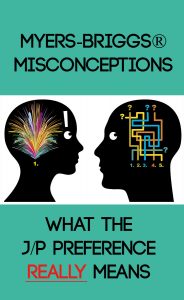
Subscribe to Our Newsletter

Want to discover more about personality type? Get the inside scoop with Susan Storm on all things typological, along with special subscriber freebies, and discounts on new eBooks and courses! Join our newsletter today!










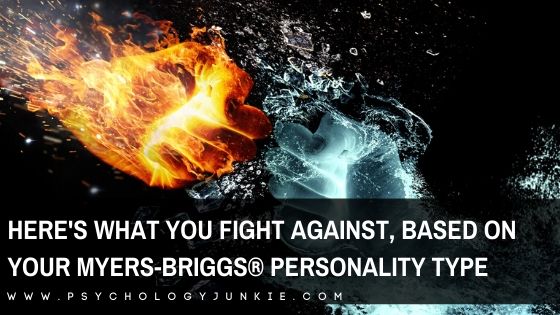


So good, thank you! This makes so much sense! It explains why my INFJ family members tend to share their firmly decided decisions with me (Fe), but I’m always wondering what perceptions (Ni) led them to those decisions–what underlying assumptions/gut feelings/observations they’re using to make those decisions. And why people are sometimes surprised when I finally articulate a decision that’s been brewing inside for months or years.
wow, I would really have to take some time to really ingest those concepts. Really awesome, even potentially dangerous information you’re giving away here! on the edge..! …I don’t think it answered the question I was looking to answer though: what exactly does it mean when a person judges, vs perceives? …introverts/extroverts direct psychic energy inwards/outwards … sensing/intuiting are more concrete/abstract processing information from the world .. thinking/feeling is obvious . but… what do they mean by judging/perceiving? …I am want to say that a judger likes to ‘concretize’ or ‘segment’ or ‘order’ the world immediately as they see it .. but a perceiver likes to keep it open and abstract, fluid … is more passive than assertive in processing information and the process of change … is it an orientation towards TIME??
Thank you, I have read many articles, but this one is very helpful
thank you, it kinda
Thank you, it kinda explain everything.
You’re simply awesome I love your works!
Thank you so much!! 🙂
Thank you very much. This really helped me figure out if I’m an INFJ or INFP. On 16personalitytypes.com my test twice said Im P and not J, but I identify better with being a J.. lol. It is interesting. I’m very closely Either a J or P. Lol.
Thank you very much for this and your other articles, this combined with reading Personality Hacker is helping me understand the fundamentals of the theory. I’ve known since Sr. year of High School which type I am, but never understood the Cognitive stacks. This article in particular was helpful in explaining how the dominant Judging or Perceiving function is always extroverted. My goal is to find out what type someone is and “on the fly” order their cognitive functions.
Thank you very much. This really helped me figure out if I’m an INFJ or INFP. On 16personalitytypes.com my test twice said Im P and not J, but I identify better with being a J.. lol. It is interesting. I’m very closely Either a J or P. Lol.
Thank you for this insight
Thank you so much, this gave me a clearer idea about my personality type INFJ, knowing that I was an INFP months ago ????
INFJ here, I mistyped as an INFP during a period in my life where I lacked motivation, and therefore structure, I wasn’t completely myself. It makes so much sense that introverts are easier mistyped because of their dominant perceiving function.
I thought my challenge with expressing my thoughts and ideas was because of extraverted intuition, but I now understand it’s because of the Ni-Fe combo. Ni is hard to translate into Fe, and I find it really hard to engage Ti when I speak, especially around multiple people.
I thought my Ni was Fi+Ne working together, but I have never felt particularly creative, just that things come to me/fall into place. I also mistook the Ni idealization/perfectionism for Fi. But now, it’s no wonder I am an Ni-dominant. And everything in my life falls into place when I see Se as my inferior, not my polar.
Thanks for clearing this up!
Best exposition of the arcane J/P preference I have seen, so thank you. I’ve taken many personality tests and been typed as INTJ, INFJ, ISFJ, INTP and INFP (plus also INxx and INxJ when the test couldn’t decide and/or concluded I was balanced) and Enneagram 1,2,4,5,6 and 9 with various wings! But I relate best to INFJ and 5 (which kind of explains why I’ve always found ordinary life so difficult but ‘difficult’ things very easy and felt universally misunderstood)
Interesting article! I’m a psychology major and I’ve never heard of the J/P preference before. I’m going to have to look into it more.